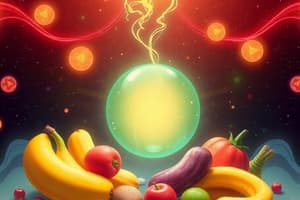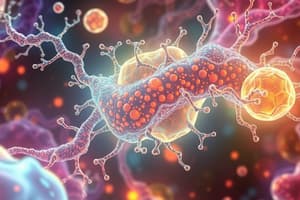Podcast
Questions and Answers
If an individual has a genetic abnormality that disrupts the function of hormones controlling appetite, what is the MOST likely outcome?
If an individual has a genetic abnormality that disrupts the function of hormones controlling appetite, what is the MOST likely outcome?
- Decreased production of leptin, causing a suppressed appetite.
- Diminished signals to stop eating, potentially leading to excessive weight gain. (correct)
- Increased sensitivity to satiety signals, leading to undereating.
- Enhanced energy metabolism, resulting in weight loss.
Which hormone is produced by adipose cells and sends a signal to the brain to decrease appetite?
Which hormone is produced by adipose cells and sends a signal to the brain to decrease appetite?
- NPY (Neuropeptide Y)
- Leptin (correct)
- CCK (Cholecystokinin)
- Ghrelin
Ghrelin is referred to as the 'hunger hormone' because it has which primary effect on the body?
Ghrelin is referred to as the 'hunger hormone' because it has which primary effect on the body?
- It inhibits fat storage and promotes the release of insulin.
- It decreases appetite and increases energy expenditure.
- It stimulates appetite, increases food intake, and promotes fat storage. (correct)
- It stimulates the digestion of fats and proteins in the small intestine.
What is the primary function of CCK (Cholecystokinin) in the gastrointestinal system?
What is the primary function of CCK (Cholecystokinin) in the gastrointestinal system?
NPY (Neuropeptide Y) primarily influences the body by stimulating which system?
NPY (Neuropeptide Y) primarily influences the body by stimulating which system?
Where is NPY produced?
Where is NPY produced?
How does insulin regulate blood glucose levels in the body?
How does insulin regulate blood glucose levels in the body?
What is the expected outcome, when blood glucose levels are elevated?
What is the expected outcome, when blood glucose levels are elevated?
Flashcards
Hormones and Appetite
Hormones and Appetite
Chemicals that affect hunger 'and fullness by acting on brain centers.
Leptin
Leptin
Hormone from adipose cells that decreases appetite.
Ghrelin
Ghrelin
Hormone primarily from the stomach that stimulates appetite.
CCK (Cholecystokinin)
CCK (Cholecystokinin)
Signup and view all the flashcards
NPY (Neuropeptide Y)
NPY (Neuropeptide Y)
Signup and view all the flashcards
Insulin
Insulin
Signup and view all the flashcards
Satiety
Satiety
Signup and view all the flashcards
Adipose cells
Adipose cells
Signup and view all the flashcards
Study Notes
- Hormones play a crucial role in regulating hunger, fullness, and satiety by interacting with specific brain centers, particularly the hypothalamus, which integrates these signals to manage food intake and energy balance effectively.
- Genetic defects can disrupt hormone targeting, causing diminished satiety signals and potential weight gain.
- Appetite control is regulated by hormones like leptin, CCK, ghrelin, and PPY.
- Hormone deficiencies can negatively impact energy metabolism.
Leptin
- Produced by adipose cells, decreases appetite upon release.
- Signals the brain that enough food has been consumed, inhibiting appetite.
- Informs the brain of caloric intake and energy stores.
Ghrelin
- Produced primarily by the stomach, with smaller amounts from the small intestine, pancreas, and brain.
- It is the opposite of leptin, increasing appetite, food intake, and fat storage.
- Stimulates fat deposition and growth hormone release, leading to increased hunger and fat storage.
CCK (Cholecystokinin)
- Released in the gastrointestinal system to stimulate fat and protein digestion.
- Secreted by cells of the upper small intestine.
- Released when amino acids or fatty acids enter the stomach or small intestines.
- Stimulates gallbladder contraction and bile release into the intestine, aiding fat and protein breakdown.
NPY (Neuropeptide Y)
- Neuropeptide hormone linked to the autonomic nervous system.
- Neuropeptides are small protein-like molecules for neuron communication.
- Influences brain and body activity.
- Specialized hormone from the hypothalamus.
- Stimulates the sympathetic nervous system, which increases appetite and fat storage.
Insulin and Glucose
- Insulin is produced by the pancreas when blood glucose levels are high.
- It promotes glucose uptake for fuel or storage as glycogen.
- Insulin prevents blood sugar from becoming too high (hyperglycemia).
- Insulin increases glucose uptake in peripheral tissue (e.g., skeletal muscle) and decreases glucose production by the liver.
Glucagon
- Released when blood sugar levels decrease below a certain threshold.
- Stimulates glycogen breakdown in the liver, releasing glucose into the bloodstream for fuel.
Studying That Suits You
Use AI to generate personalized quizzes and flashcards to suit your learning preferences.



